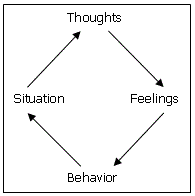
My theoretical approach is based on cognitive behavior therapy (CBT). CBT has proven to be effective for many psychological problems. In short, CBT looks at the connections between your thoughts, feelings, and behaviors. It assumes that the way you interpret a situation determines how you feel, and then how you feel determines how you act.
Understanding how past experiences influence who you are in the present is important, but the focus of therapy sessions is on present-day experiences and problematic patterns of thinking- feeling- acting. CBT emphasizes a collaborative partnership between therapist and client, with both members taking an active role. To learn more about cognitive behavior therapy, check out some websites in my Links page.

Standard CBT seeks to change thoughts, feelings, and behavior. However, sometimes attempting to change how we think, feel, or act in a given situation is not possible, wise, or realistic. For this reason, I often incorporate “third-wave” cognitive behavioral approaches. Third-wave CBT uses elements of eastern philosophy to teach us how to accept things we cannot change, how to be aware or “mindful” of our internal experiences, and how to live life in the present. The goal is to fully participate in living a life that is consistent with your personal values, along with the pain and loss that is inevitably a part of human experience.
As a therapist, I strive to be genuine, compassionate, nonjudgmental, and pragmatic. I see therapy as a collaborative process, and the foundation of that process is a trusting working relationship between therapist and client. I believe you are the expert on your life and experiences, and I view myself as a consultant and coach who uses psychological science to empower you to achieve your goals. Although therapy will deal directly with your problems, we’ll also seek to identify and develop your unique strengths and passions. We will both take an active role in therapy. Together we will identify specific goals, strategies, and a time frame for therapy, and along the way we will evaluate our progress and modify the plan as needed. Therapy is typically time-limited, and the ultimate goal is for you to learn to be your own therapist, with the ability to reflect on your problems and apply what you have learned.
